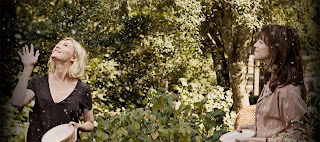During the run up to Melancholia, deliberately provocative filmmaker Lars Von Trier loudly proclaimed there would be "No more happy endings!". This was clearly a joke to anyone who has seen many of his previous works(Breaking the Waves, Dancer in the Dark), most involving immeasurable amounts of suffering by the lead character, usually a woman, followed by a torturous and fatal climax. Perhaps due to his own struggles with depression, Von Trier seems to be at his best when he gets to meditate on those dealing with an oppressive inner turmoil. Melancholia may be his most insightful work yet, set against the back drop of the world's ultimate destruction by a nearby planet.
Rather than letting us sit and wonder whether the world will actually be destroyed, Von Trier wastes no time ensuring us that it certainly will. The end is never in doubt, and while that may seem to be anti-climactic, it's actually remarkably freeing. The film opens ominously, with a series of meticulous, lavish slow motion scenes of what lay ahead, set against a ubiquitous opera score. If you had any doubts things were going to turn out terribly for all involved, this is your cue to think again. Taking place in a lush, extravagant palatial estate, the film is divided into two parts. The first features Justine(Kirsten Dunst), the moody and depressed bride-to-be at a lavish wedding thrown by her sister, Claire(Charlotte Gainsbourg). Justine just can't break out of her spell, and doing even the slightest things like thanking people and taking wedding photos is clearly a chore. She seems restless, beaten down by life. This is a marriage doomed before it ever began. The only one who doesn't seem to know it right away is her lovestruck husband(Alexander Skarsgard). Hopefully he got insurance on the honeymoon package.
As the constant annoyances of the guests wear Justine down, namely her oblivious boss(Stellan Skarsgard) and vile mother(Charlotte Ramplings), she lapses into a depression bordering on catatonic. Where the first part of the film plays Justine's disinterest in darkly comic ways, the second half takes a slower, introspective pace. Claire's husband(Kiefer Sutherland), when not snarling at Justine's attitude, becomes enamored with the news of a giant blue passing dangerously close to Earth. Justine seems to know instinctively that something awful will happen, but strangely is almost calmed by the impending disaster. Her mood lightens, while Claire spirals into insanity.
Dunst makes for the ideal Von Trier heroine, beautiful yet imperfect. Flawed but not broke. Nobody would ever expect for the former Bring It On cheerleader to fit with Von Trier's harsh style. She's never been better, and should be on everyone's mind when the Academy Awards roll around. The same could be said for Gainsbourg, who is like Dunst's polar opposite in so many ways. Not just in her harder edge look, but in the way she epitomizes Von Trier's minimalist Dogme style, while Dunst is like the shiny new toy he breaks out when he wants to indulge. Sometimes the two styles clash violently, but at least it's not the misogynistic morass that was Antichrist.
It takes a true master to be able to wield science fiction in the way Von Trier does with Melancholia, finding beauty in the chaos of human emotion. Another Earth, a festival hit from the promising young filmmaker Brit Marling, attempted some similar ideas a few months ago, but with far less skill, lacking Von Trier's immersing ability and flair for the dramatic.













